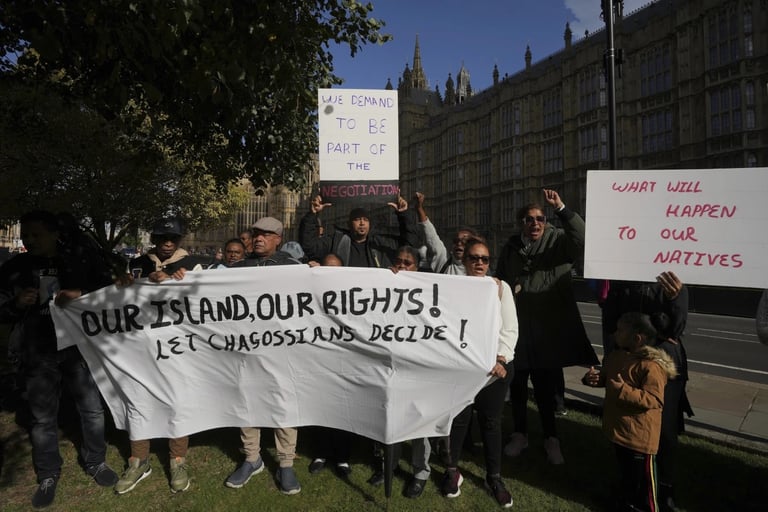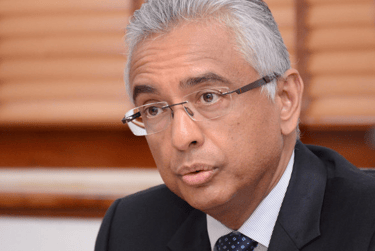BIOT negotiations compromised as security breaches emerge
Last Saturday, The Independent published allegations of phone hacking targeting the British High Commission in Mauritius. Private conversations between High Commissioner Charlotte Pierre, Mauritian government officials, and local businessman Ken Arian were leaked online and posted to a popular local Facebook page, "Missie Moustass," where the recordings garnered thousands of views.
NEWS FROM THE OVERSEAS TERRITORIESBRITISH INDIAN OCEAN TERRITORY
Last Saturday, The Independent published allegations of phone hacking targeting the British High Commission in Mauritius. Private conversations between High Commissioner Charlotte Pierre, Mauritian government officials, and local businessman Ken Arian were leaked online and posted to a popular local Facebook page, "Missie Moustass," where the recordings garnered thousands of views. Several Mauritian journalists were also reportedly targeted, including Murvind Beetun, who confirmed the authenticity of one leaked call in an interview with The Independent. While the credibility of the leaked recordings has not been fully verified, Mr Beetun's verification casts doubt on claims by Mauritian Prime Minister Pravind Jugnauth that the leaks merely constituted "fabricated conspiracies and falsehoods" produced through AI manipulation.
These breaches are alleged to have occurred during early negotiations over the sovereignty of the British Indian Ocean Territory, initiated by Liz Truss in late 2022. The UK's Foreign, Commonwealth & Development Office (FCDO) confirmed that Mauritian authorities are investigating the breach but declined to comment further pending the inquiry's progress.
Whilst this incident alone raises serious questions over the security and confidentiality of negotiations, it fits into a broader picture of murky activity surrounding the BIOT talks in recent months. According to a recent article by Dr Jack Watling in RUSI, several Sri Lankan-registered fishing vessels were intercepted in the BIOT marine conservation area carrying sophisticated radar equipment. With British sovereignty over the Chagos Islands set to be ceded to Mauritius, the Royal Navy’s ability to conduct security patrols beyond Diego Garcia risks being greatly diminished, allowing for more numerous and penetrating intelligence gathering missions by those seeking to monitor and disrupt operations conducted from the airbase. Additionally, the handover could open the door for China and other major powers in the region to establish military installations on other islands in the archipelago, further jeopardising the security of the Diego Garcia installation. Given that Mauritius has already approved the construction of an Indian airbase on the island of Agalega, such concerns are not without recent precedent.
More broadly, the use of ‘lawfare’ by the Mauritian government in order to pursue their claim to the Chagos Islands at the ICJ has created a dangerous blueprint for how Britain’s opponents might inflict economic and political damage through the use of international courts. Throughout Mauritius’ pursuit of sovereignty over the Chagos Archipelago, it received extensive support from both Russia and China. As the former MP Henry Smith contended, the proceedings against the UK at the UN constituted little more than “basically all of our enemies lining up to say Britain’s a horrible colonial power… the likes of the Chinese, the Russians, the Iranians - of course, they’re going to vote against Britain.” The UK Government’s willingness to cede territory in the face of this strategy, ostensibly for the purposes of ‘soft power’, has merely underscored the effectiveness of this ‘lawfare’ tactic. As Lord West noted in a recent statement, efforts to reduce the UK's global influence by systematically increasing diplomatic and legal pressure wherever possible are only likely to become more prolific and widespread as the world becomes a more uncertain place.
Had the deal been negotiated with the views of the Chagossian people consulted throughout the process, it would be easier to overlook these irregularities. Yet this agreement has been assented to by the British government with only token outreach to those that this decision affects most profoundly. Not only has the FCDO failed to properly consult with Chagossians who live in Britain, but the Mauritian government has also passed legislation criminalising anyone who opposes their claim to the islands. Given these circumstances, it is impossible to see how a genuine dialogue could have taken place over the transfer of sovereignty. The forcible removal of the Chagos Islanders from their homeland between 1967 and 1973 was a shameful policy decision by the British government, but attempts to cast this latest agreement as an act of atonement for this wrongdoing are deeply misguided. Any real solution for the victims of this longstanding injustice must centre the voices of the displaced Chagossians, not just in Mauritius but around the world. The current deal simply allows Britain to wash its hands of any further responsibility for the future of the islands, meaning it can avoid engaging in the more challenging process of doing right by the Chagossians.
The legal proceedings surrounding the British Indian Ocean Territory offered the UK an opportunity to show resolve in the face of this weaponisation of international law, but it has instead only demonstrated weakness. The true ramifications of this decision risk becoming painfully apparent in the years to come.


Members of the Chagossian community protest outside the UK Parliament (credit: Chagossian Voices)


Mauritian Prime Minister Pravind Jugnauth
Friends of the British Overseas Territories made the following statement on the 20th October:
“This revelation fits into a broader pattern of activity:
A Mauritian-led anti-British coalition in the UN supported by China and Russia.
Spyware seized in fishing vessels.
Phone hacking.
Negotiations were compromised by malign actors from the start. The UK must reconsider.”
